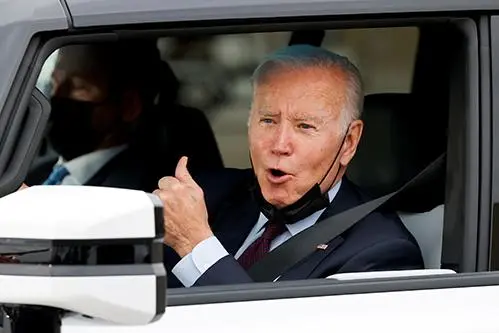PHOTO
(The author is a Reuters Breakingviews columnist. The opinions expressed are his own.)
NEW YORK - Politicians everywhere know rising gasoline prices spell trouble. Just look at France’s "yellow vest" protests that started in 2018 against a planned rise in gas taxes. U.S. President Joe Biden has responded to recent high fuel costs by asking the Federal Trade Commission to look for evidence of anticompetitive behavior. He's shooting a blank, but it's a political necessity even if it conflicts with his bigger goals.
Similar tactics were even used by Biden’s oil-friendly predecessor George W. Bush, who ordered the Department of Justice to examine price gouging by energy firms back in 2006. Yet while Exxon Mobil and Chevron might double their net income this year compared to 2019, as Biden’s letter to FTC Chair Lina Khan points out, it’s almost certainly not because of collusion. Oil is a global commodity, and even America's biggest players are usually price takers.
Moreover, U.S. antitrust regulators are aware the market is competitive. Khan may see more risks than her predecessors have, but the FTC hasn’t stood in the way of a major oil merger in two decades.
Biden's effort to jawbone allies to release their stockpiles of oil in a coordinated fashion might have more effect. News that Asian nations were considering it sent the Brent crude price below $80 per barrel on Thursday morning, from above $82 the day before. Washington was mulling releasing perhaps 20 million to 30 million barrels in total, according to a Reuters source. Yet the problem lies more in production. The Organization of the Petroleum Exporting Countries and its allies have about 7 million barrels per day of spare capacity, roughly twice Exxon's production.
Biden’s most effective tool to reduce fuel prices could be to push for an increase in U.S. production, which was 11.4 million barrels per day in August according to government figures, a reduced pace compared to the pre-pandemic level in 2019. Yet with the planet warming, Biden and many in his Democratic voting base want to transition away from fossil fuels. Unaffordable gasoline and resulting voter discontent, however, might put all of Biden’s goals at risk.
CONTEXT NEWS
- U.S. President Joe Biden said in a letter to the U.S. Federal Trade Commission on Nov. 17 that there was “mounting evidence of anti-consumer behavior by oil and gas companies.” He asked Chair Lina Khan to examine whether illegal conduct was raising fuel prices.
- The letter said unfinished gasoline prices dropped over the past month, but prices at the pump rose. It also noted the two largest U.S. oil and gas companies were on track to nearly double their net income this year compared to 2019. The two biggest American energy groups are Exxon Mobil and Chevron.
- The Biden administration has also asked several nations, including China, India, South Korea and Japan, to consider releasing strategic oil stockpiles to lower global energy prices, according to Reuters sources.
(The author is a Reuters Breakingviews columnist. The opinions expressed are his own.)
(Editing by Richard Beales and Amanda Gomez) ((For previous columns by the author, Reuters customers can click on CYRAN/ SIGN UP FOR BREAKINGVIEWS EMAIL ALERTS https://bit.ly/BVsubscribe | robert.cyran@thomsonreuters.com; Reuters Messaging: robert.cyran.thomsonreuters.com@reuters.net))





















